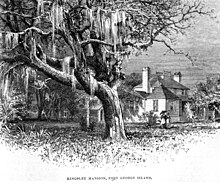| An editor has nominated this article for deletion. You are welcome to participate in the deletion discussion, which will decide whether or not to retain it.Feel free to improve the article, but do not remove this notice before the discussion is closed. For more information, see the guide to deletion. Find sources: "Kingsley Beatty Gibbs" – news · newspapers · books · scholar · JSTOR%5B%5BWikipedia%3AArticles+for+deletion%2FKingsley+Beatty+Gibbs%5D%5DAFD |
This article has multiple issues. Please help improve it or discuss these issues on the talk page. (Learn how and when to remove these messages)
|


Kingsley Beatty Gibbs (Brooklyn Heights, New York, July 25, 1810 — St. Augustine, Florida (?), October 18, 1859), described as "an unusually quiet man with easy manners and a soft low voice,"is most remembered for being a nephew of slave trader Zephaniah Kingsley, in fact Kingsley's leading white relative. In 1833 he married Ana Eduarda Teresa Hernández, but she died after three years, with no children surviving from the marriage. Later he married Laura Williams, and they had two children.
Gibbs' first position was Deputy Clerk of the Duval County, Florida, Superior Court. He was elected an alderman of St. Augustine in 1835. In 1836 and 1837 he was a member of the Florida militia. When in 1839 Kingsley sold his Fort George Plantation and moved his complex mixed-"race" family to Haiti, Gibbs purchased it. He farmed the plantation, using slave labor, and was elected to the Territorial Legislature. He was reported as opposed to Florida statehood. In 1846 his name appeared in the paper for helping shipwreck victims. In 1851, giving his address as Mayport Mills, Duval County, he advertised the products of the United States Mutual Insurance Company. In 1852 he sold the plantation and moved to St. Augustine, where he was again an alderman on the city council from 1854 to 1856.
When Kingsley died in 1843, Gibbs, an executor of his will, inherited 1,000 acres (400 ha) in St. Johns County, the books from his library, his weapons, the schooner "North Carolina", and one twelfth of the estate, including slaves. He was also named guardian of Kingsley's minor children.
It was about this time that he built a mill called Mayport Mill near the mouth of the St. Johns River, giving the location the name, Mayport, that it bears today.
Shortly before his death he wrote memoirs covering in some detail life at the plantation, which indirectly illuminate Kingsley's era. By good fortune this then-unidentified manuscript reached the park manager at the Kingsley Plantation State Historic Site, and it has been published and annotated.
No visual image of Gibbs is known.
References
- ^ Gibbs, Kingsley Beatty (1984). Fretwell, Jacqueline K. (ed.). Kingsley Beatty Gibbs and His Journal of 1840-1843. St. Augustine, Florida: St. Augustine Historical Society.
- "City Election". Charleston Daily Courier. Charleston, South Carolina. November 20, 1835. p. 2.
- https://www.staugustine.com/story/news/local/2020/02/08/susan-parker-as-early-county-clerk-kb-gibbs-had-heavy-workload/1745087007/
- King, Terry Johnson (January 2, 1976), "Getting out of hock the key to statehood.", Miami News, p. 50
- "A Wreck at Night—The Steamer Mutual Safety Lost—But All On Board Saved". Brooklyn Daily Eagle. October 21, 1846. p. 2.
- "United States Mutual Insurance Company". Jacksonville Florida Republican. December 18, 1851. p. 4.
- Kingsley, Zephaniah (July 20, 1843), Copy of Zephaniah Kingsley's will dated July 20, 1843, Amelia Island Museum of History, retrieved February 1, 2023